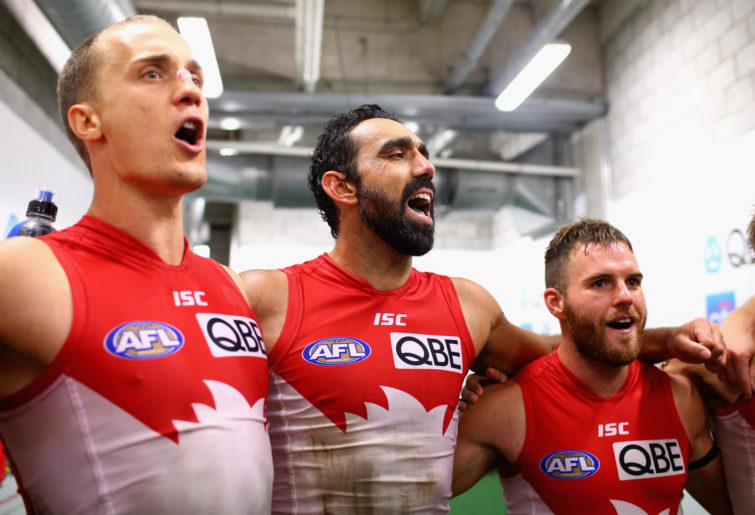
[ad_1]
That situation arose not from anything Goodes created himself: more from the appalling treatment he received from AFL fans, sections of the media and, subsequently, the game’s administrators.
To many, Goodes retired a hero, and then became the most beaten and bruised pawn in a vicious game fuelled by people without the capacity to actually consider the social repercussions of their actions, comments and views.
As a man, Goodes deserved a whole lot better. Yet the greatest crime of all was that the AFL as a governing body never really understood the magnitude of the situation. They failed to protect a much-loved player and icon, whilst also seemingly existing in a space where the bigoted views of some sections of the public hamstrung them from any meaningful action.
Departing league CEO Gillon McLachlan and the AFL Players Association admitted as much in June 2019, when an unreserved apology was given to the modern legend.
Yet it did little to smooth over the issues that had visibly hurt Goodes throughout the final years of his playing days.
Now, with the AFL still grappling with racial and social issues that make every one of us uncomfortable each and every time they crop up, Goodes has shifted his focus and taken on a role in a game that played a key role in his development as an athlete.
In his new position on the council of Indigenous Football Australia, Goodes will re-engage with the game that he considers his first love, and use both his sporting and professional skills to establish and improve the pathways for young Indigenous boys and girls in the domestic game.
It seems somewhat odd and perhaps even ironic that one of the AFL’s greatest modern players would have preferred to have excelled in the round-ball game. However, as is often the case in Australia, access was key.
Despite Goodes admitting openly in recent days that his passion for football was far stronger than any emotional connection he felt towards AFL, he soon stopped kicking a sphere around and began leaping into packs, taking marks and kicking goals that will live in the minds of Swans fans for many years to come.

Ted Richards played with Adam Goodes during the booing saga of 2013-15. (Photo by Ryan Pierse/Getty Images)
I first met Adam on the 9th green at the Coast Golf Club in Sydney back in the late 1990s. He was a young kid being shown the ropes by cousin and fellow Swans legend Michael O’Loughlin.
I was introduced to him by my Indigenous flatmate at the time, who knew O’Loughlin well. The pride that emanated from him as he talked with and listened to his heroes is something that has stayed with me to this very day.
Both men rarely missed a beat when it came to fulfilling the role model status so unfairly expected of every successful sportsperson. Thus, the way Goodes ended his playing days in 2015 now looks even more unfortunate, tragic and unfair than it did at the time.
Goodes will surely be a brilliant asset for football – a sport that, unlike rugby league and AFL, has not had a great deal of success in terms of improving access for young male Indigenous players, nor seen many rise to the heights of Socceroo selection.
Whilst not working for Football Australia directly in his role at IFA, the obvious passion for the game that Goodes possesses could well see him become a key player for the code in the medium-term future.
A person of his integrity, talent and experience is an attractive candidate for a position on the board of the national body, should he embrace and thrive working in his new role.
It was heartbreaking to watch Goodes slide slowly from the game in which he excelled, and the subsequent hole in his heart was clearly evident in subsequent comments and interviews.
Now, football has thrown its arms open to the 2014 Australian of the Year, and asked for his assistance in a space within which the game must improve.
He is very welcome.

Leave a Reply